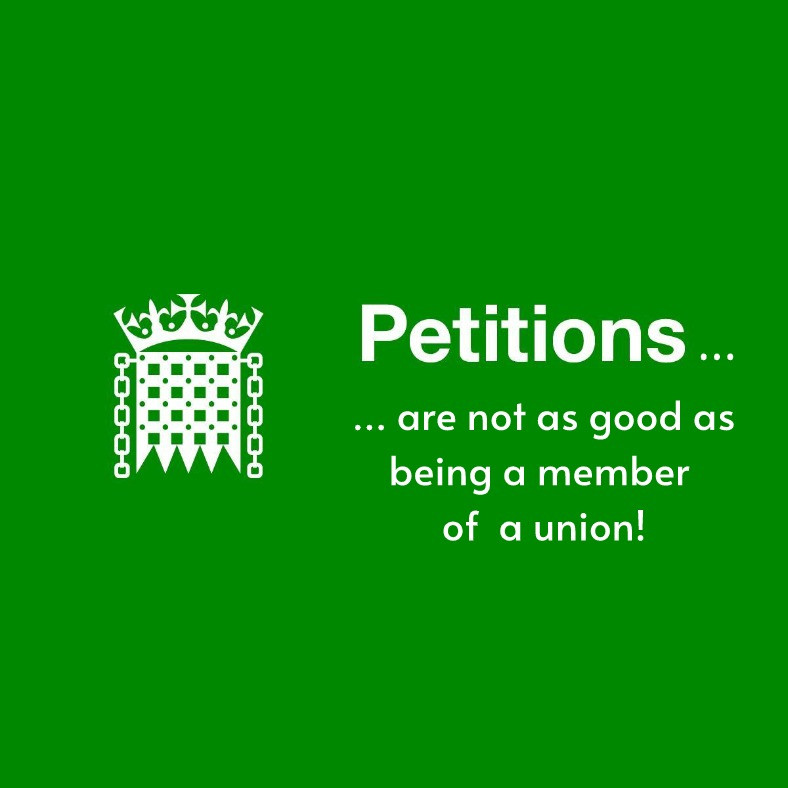If you work in TEFL, there’s a good possibility you’re in a WhatsApp group where someone has sent a link to the petition “Extend business rates relief to include every English language teaching school.”
Many of us may have already signed this. After all, tax relief might mean your school stays open or can spend that money to save a few more jobs. This has to be a good thing, right?
At the TEFL Workers’ Union, we think there’s good reason to consider this petition a bit more deeply.
Who’s behind this petition?
The petition was created by Jodie Gray. Jodie Gray is the Interim Chief Executive of English UK.
Ask yourself, what has English UK done for teachers during the crisis? Did they pressure schools to offer full paid sick leave from day 1? Did they require their member schools to top up the furlough payments to 100%? Has English UK encouraged schools to offer more than the statutory minimum when making redundancies? These are practical things that English UK could have done to materially benefit language school staff – but didn’t.
Whose interests are being promoted?
Industry – the TEFL industry or otherwise – always wants lower taxes. And, yet, those same industries are happy to claim the benefits of a well-funded public purse. Language schools happily took public money to keep their staff on furlough, but how many schools topped up staff beyond the 80%? And then once schools were required to contribute towards the cost of furlough, how many of them did so? How many responded with redundancy consultations instead?
And who benefits?
Business rate relief, by its very nature, benefits employers. There’s no guarantee that benefits will be passed on to us or our students.
Schools closings, redundancies, reductions in pay, downgrading of contracts – it’s clear that the cost of this crisis is being taken out on us.
Some schools might legitimately be in financial trouble, but what of schools that have the money? Have they used that money to save jobs or protect staff? Is there evidence other employers would act differently if given tax relief?
EF language school, a veritable ‘market leader’, is currently making 50% redundancies across the UK. EF is owned by Bertil Hult, a man with a net worth of £6 billion, who owns a $35 million yacht, a $60 million private jet, and was named in the Paradise Papers for his questionable tax practices. As a company, the UK arm of EF has £3.3 million in the bank. EF, in Britain alone, regularly pays out £4 million in dividends to investors year-on-year.
Staff at EF were told that the dire financial situation made redundancies inevitable and that the company could only offer the statutory minimum. Yet, in their most recent financial filing, EF had this to say to their stockholders in relation to the COVID crisis:
“With respect to the business in the UK, it is still the opinion of the board that cost will be recovered and there is low risk.”
Is this a company that needs tax relief? Is there any evidence that tax relief will be used to benefit staff at EF or any other language school?
But surely getting this discussed in Parliament must be a good thing?
COVID has hit TEFL exceedingly hard – arguably harder than any other industry. Yet, it’s not being talked about in the media or by politicians.
In Ireland, however, that’s not the case. The Irish education ministry has released guidance specific to language schools and met with representatives of both TEFL school owners and TEFL staff when crafting a response to the crisis. So what’s different about Ireland?
In Ireland, the UNITE ELT Union has existed for a number of years, leading strikes and seeking recognition at a number of schools.
As a response, language school owners in Dublin formed a trade association so they could coordinate a response to growing militancy and worker organisation in the industry.
As a result, the government took notice: ‘Organised workers and organised owners? We better take this sh*t seriously…’
We don’t have that in the UK and a petition won’t change that.
What will force change is us, language school workers, getting organised. We need to recognise that our interests differ from those of language school owners – and industry bodies like English UK that represent them.
There are no shortcuts – certainly not industry-backed petitions. We need to have the confidence to speak to our own interests and, when necessary, the courage to back it up with action.
The TEFL Workers’ Union wants to make sure all language school workers have a voice – in their own workplaces, in the industry, and in wider society. If you want to help make that happen, you can join the union here: https://iww.org.uk/join/
Questions, enquiries, or help with problems at work: tefl [at] iww [dot] org [dot] uk
